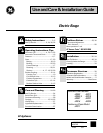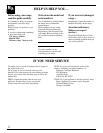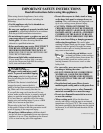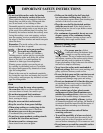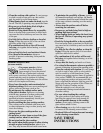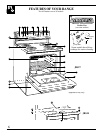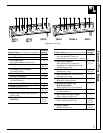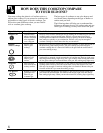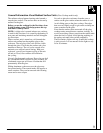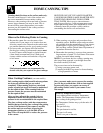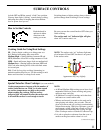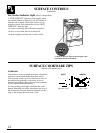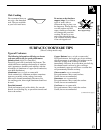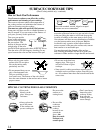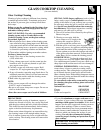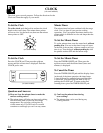
Important Safety Instructions
• Clean the cooktop with caution. If a wet sponge
or cloth is used to wipe spills on a hot surface
unit, be careful to avoid steam burns.
• When flaming foods are under the hood, turn the
fan off. The fan, if operating, may spread the flame.
• Keep an eye on foods being fried at high or
medium high heat settings.
• Foods for frying should be as dry as possible.
Frost on frozen foods or moisture on fresh foods
can cause hot fat to bubble up and over the sides
of the pan.
• Use little fat for effective shallow or deep-fat
frying. Filling the pan too full of fat can cause
spillovers when food is added.
• If a combination of oils or fats will be used
in frying, stir together before heating, or as fats
melt slowly.
• Always heat fat slowly, and watch as it heats.
• Use a deep fat thermometer whenever
possible to prevent overheating fat beyond the
smoking point.
Radiant Surface Units
(on some models)
• Use proper pan size—Select
cookware having flat bottoms
large enough to cover the selected
surface unit. The use of undersized cookware
will expose a portion of the surface unit to direct
contact and may result in ignition of clothing.
Proper relationship of the cookware to the surface
units will also improve efficiency.
• Never leave the surface units unattended at
high heat settings. Boilovers cause smoking and
greasy spillovers that may catch on fire.
• Do not operate the radiant surface units
if the glass is broken. Spillovers or cleaning
solution may penetrate a broken cooktop and
create a risk of electrical shock. Contact a
qualified technician immediately should your
glass cooktop become broken.
• Avoid scratching the glass cooktop surface.
The cooktop can be scratched with items such
as sharp instruments, rings or other jewelry and
rivets on clothing.
• Never use the glass cooktop surface as a
cutting board.
• Do not place or store items on top of the glass
cooktop surface when it is not in use.
• Do not stand on the glass cooktop.
• Be careful when placing spoons or other stirring
utensils on glass cooktop surface when it is in
use. They may become hot and could cause burns.
• To minimize the possibility of burns, ignition
of flammable materials and spillage, the handle
of a container should be turned toward the center
of the range without extending over the nearby
surface units.
• Always turn the surface units off before
removing the cookware.
• Keep an eye on foods being fried at high or
medium high heat settings.
• When flaming foods are under the hood, turn
the fan off. The fan, if operating, may spread
the flame.
• Foods for frying should be as dry as possible.
Frost on frozen foods or moisture on fresh foods
can cause hot fat to bubble up and over the sides
of the pan.
• Use little fat for effective shallow or deep-fat
frying. Filling the pan too full of fat can cause
spillovers when food is added.
• If a combination of oils or fats will be used
in frying, stir together before heating, or as fats
melt slowly.
• Always heat fat slowly, and watch as it heats.
• Use a deep fat thermometer whenever possible to
prevent overheating fat beyond the smoking point.
• Clean the cooktop with caution. If a wet sponge
or cloth is used to wipe spills on a hot surface
unit, be careful to avoid steam burns. Some
cleaners can produce noxious fumes if applied to
a hot surface. NOTE: We recommend that you
avoid wiping any surface unit areas until they
have cooled and the indicator light has gone off.
Sugar spills are the exception to this. Please see
the Glass Cooktop Cleaning section.
When the cooktop is cool, use only the
recommended cleaning cream brand cleaner to
clean the cooktop.
• Use care when touching the cooktop.
The glass surface of the cooktop will retain
heat after the controls have been turned off.
• To avoid possible damage to the cooking
surface, do not apply cleaning cream to the
glass surface when it is hot.
• After cleaning, use a dry cloth or paper towel
to remove all the cleaning cream residue.
• Read and follow all instructions and warnings
on the cleaning cream labels.
SAVE THESE
INSTRUCTIONS
5



